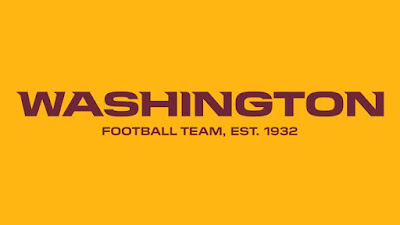Started as a place to post my academic writing on various subjects relevant to literature and philosophy, but I'm not really sure anymore.
Sunday, December 20, 2020
The Indians are Dead, Long Live the Spiders
Sunday, August 23, 2020
Identity Crisis: Sports Edition
As released on the franchise twitter machine, and the NFL, the team formally known as the Redskins will take a page from the soccer playbook and rebrand themselves as the Washington Football Team.
As reported by the Independent, this move will at least be for the 2020/2021 season, and perhaps longer, but as the NFL story seems to say, it won't be a permanent solution. The colors will stay the same, the mascot will "retire", and the helmet logo is to be replaced by players individual numbers, which is something that teams have done in the past, and some colleges still do.
So... finally the worst offender of racial mascots in post modern history has come to an end. And, in contrast to what detractors have been saying for decades, the team identity doesn't seem to be hurt at all by this. They will still be (literally) their city's team. In fact, due to the name change, presumably the team will be allowed to actually relocate back into the city limits.
Monday, July 13, 2020
Redskins No More
Saturday, April 25, 2020
Age of Corona: Movie Edition
 |
| The Hot Zone said this would happen |
After a robot-led mass extinction, nine dolls given sentience struggle to bring life back to a desolated earth. Not only is this post apocalypse, but also an alternate time-line story. Written and directed by Shane Acker, it was released in 2009.
Technically taking place in a post apocalyptic society that turned Manhattan into a penal colony, the plot is a basic escape and survive story. The basic premise is also used in the Batman Arkham City videogame. Released in 1981, written and directed by John Carpenter, this one has a real classic '80s action film feel and deserves its cult following.
Saturday, January 4, 2020
Impeached Presidentially
Impeachment is the act of impeaching someone. Where does the word come from, and what does it mean? According to the Oxford English Dictionary, to impeach means, in law, at first in a broad sense, "to accuse, bring charges against"; more specifically, of the king or the House of Commons, "to bring formal accusation of treason or other high crime against (someone)". The word evolves from the broad term in the 14th century, to the more specific "accusing a public officer of misconduct" by the 1560s.
Breaking this definition down, impeachment then is the process by which a legislating body, the people's representation in government, can indict a sitting executive for abuses of the power of the office they hold. The US Constitution defines these abuses as "high crimes and misdemeanors". Impeachment, then, is not a trial that will remove a governing official from office, necessarily. Usually it is a first step in that process, and this is true in the United States.
Impeachment in the United States is not only for presidents. In the Constitution, the president, vice president and "all civil officers" can be subject to impeachment and removal. Civil officers, in this case, means people in government not necessarily elected to office. This has basically meant justices, but also any executively appointed position. In addition to our three presidents, we have also impeached 1 senator (William Blount), 1 Secretary of War (William Belknap), and 15 federal judges. 15 of these 20 officials were then removed from office by the Senate. Both Bucchanen and Nixon had impeachment proceedings started, but not completed. Nixon resigned rather than face impeachment, and Bucchanen was found to not be responsible for the rampant corruption in his administration, and therefore not impeachable.
Our current president has a list of actions that could be deemed impeachable. Let's compare these accusations with historic charges that ended in impeachment.
1: Obstructing Justice
By blocking federal access to information important to an investigation into the president, firing federal prosecutors tasked with investigating the president, intimidating and influencing witnesses through speeches, press releases, and twitter.
Three other cases included obstruction of justice. Two were the presidents Nixon and Clinton, the third was Samuel Kent, a judge.
2: Ignoring the Emoluments Clause
Refusing to step away from businesses and business interests while in office, Trump had opened himself up to scrutiny whether he'd be able to govern in a fair and balanced manner without personal bias. There are many instances of Trump properties and business contacts getting preferential treatment.
There have been 5 impeachment cases due to corruption. Robert Woodrow Archibald was impeached specifically for accepting gifts in exchange for rulings.
3: Soliciting Foreign Interference in US Elections
This one is a bit specific, and as such unprecedented. However, there have been two impeachments that dealt with treason. William Blount was impeached for making deals to take Spanish territory on behalf of Britain. And the US judge West Hughes Humphries was impeached for supporting the Confederacy. In addition to the treasonous argument, this one is connected to the Obstruction of Justice charge.
4: Abuse of Power
This one seems to be a catch-all for just about everything else. In addition to the above charges, which can also be categorized as abusing power, Trump has called for violence and insurrection, engaged in reckless conduct as a diplomat, called for the prosecution and persecution of political opponents, attacked the free press, and violated campaign finance laws.
Four other impeachments were made using the Abuse of Power charge. Nixon was also accused of Abuse of Power.














